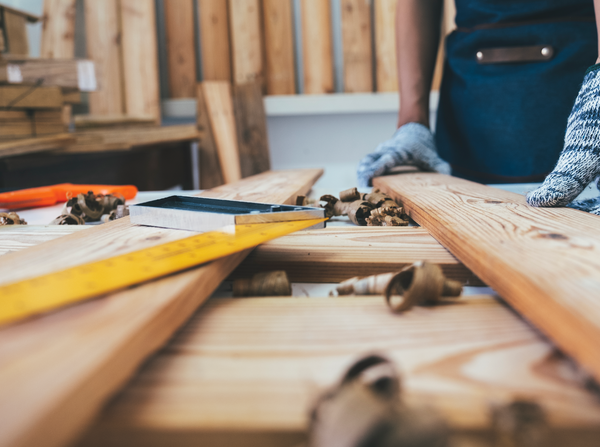
How to Get Started in Furniture Building
If you’re passionate about woodworking and would like to take your hobby to the next level, there are a few things you need to check off the list first: what tools will you need? How do your setup your workshop? What techniques do you need to know? To help you navigate these questions, we interviewed professional furniture maker Ethan Abramson (@thebuildwithethan) who’s run a successful wood shop for over 10 years. Through his podcast “Building a Furniture Brand”, we have learnt what the successful furniture makers that he talks to have done, both right and wrong, along their journey to take them where they are today.
“The reason I got into furniture making and the thing I like most about it are intertwined. I like to be creative and to control my own destiny and building furniture, as well as owning a furniture company, gives me the ability to do both.” But getting started in the professional woodworking space isn’t easy, and requires patience, confidence and a few mistakes to learn from.
The first tip is to make sure you get your furniture to stand out from competitors. “Getting your furniture to stand out visually is all about bringing a mix of eye-catching design and understandable functionality to your pieces, but that is not the whole picture. To be successful you also need to stand out with your customer service, your business practices, your forward-facing company view and much more. Making beautiful furniture is only the tip of the iceberg when it comes to building your furniture brand,” says Ethan.
When timelines are tight, choosing the right tool always matters. I’ve been using some variation of an OLFA tool for years now. From having the OLFA 18mm MXP-L Utility Knife to accurately cut workpieces, to using the OLFA 25mm XH-AL Auto-Lock Utility Knife for more heavy-duty cutting, to using the OLFA 7-Inch SCS-2 Serrated-Edge Stainless Steel Scissors to open deliveries, these tools accompany most of my projects. What’s important for me is a compact size and a good locking mechanism for the OLFA knives I use. Since they are in and out of my pocket all day when wrapping pieces or on installs, I want to make sure they fit and I don’t end up getting a hand full of blades. There are enough surprises when it comes to furniture making, and getting an unexpected injury is not one you look forward too.
And choosing the right blade is also essential when it comes to woodworking. Although I mostly use the blade that comes with the tool, there is one blade that I particularly recommend: the OLFA 25mm HSWB-1/1B Saw Blade. It’s nothing extra fancy, just a hard-working blade that stays in my go box, because it can do all the things a regular blade can, but it also has serious cutting abilities – sometimes it’s even quicker or easier than using a jig saw.
“Aside from the tools, another recommendation I can give, as cliché as it sounds, is to have a strong belief in yourself. When you are starting your own company, it’s important to be confident about you and your work, because when things go wrong, it all falls on you. To be able to dig yourself out of a hole and get things going back to business as usual is what sets successful companies apart from ones that fail,” Ethan explains, “But the biggest advice that I would like people to take away from listening to my show – Building a Furniture Brand – is that there is not one correct way to start and run a furniture company. Yes, there are practices that people can use to be successful, but everybody is approaching their company from a different place, a different mindset, and a different goal of what they want to make out it. So, as long as you are running your company the way you want to and feel like you are getting the type of success out of it that meets your own standards, then that right there is a successful business.”
Ethan Abramson Bio:
Ethan produces his own line of furniture as well as custom commissions for residential and commercial projects. He loves the creative process that comes with woodworking, and he allows the materials to influence designs as much as the function does. You can find more about him at thebuildwithethan.com and listen to his podcast at buildingafurniturebrand.com.






